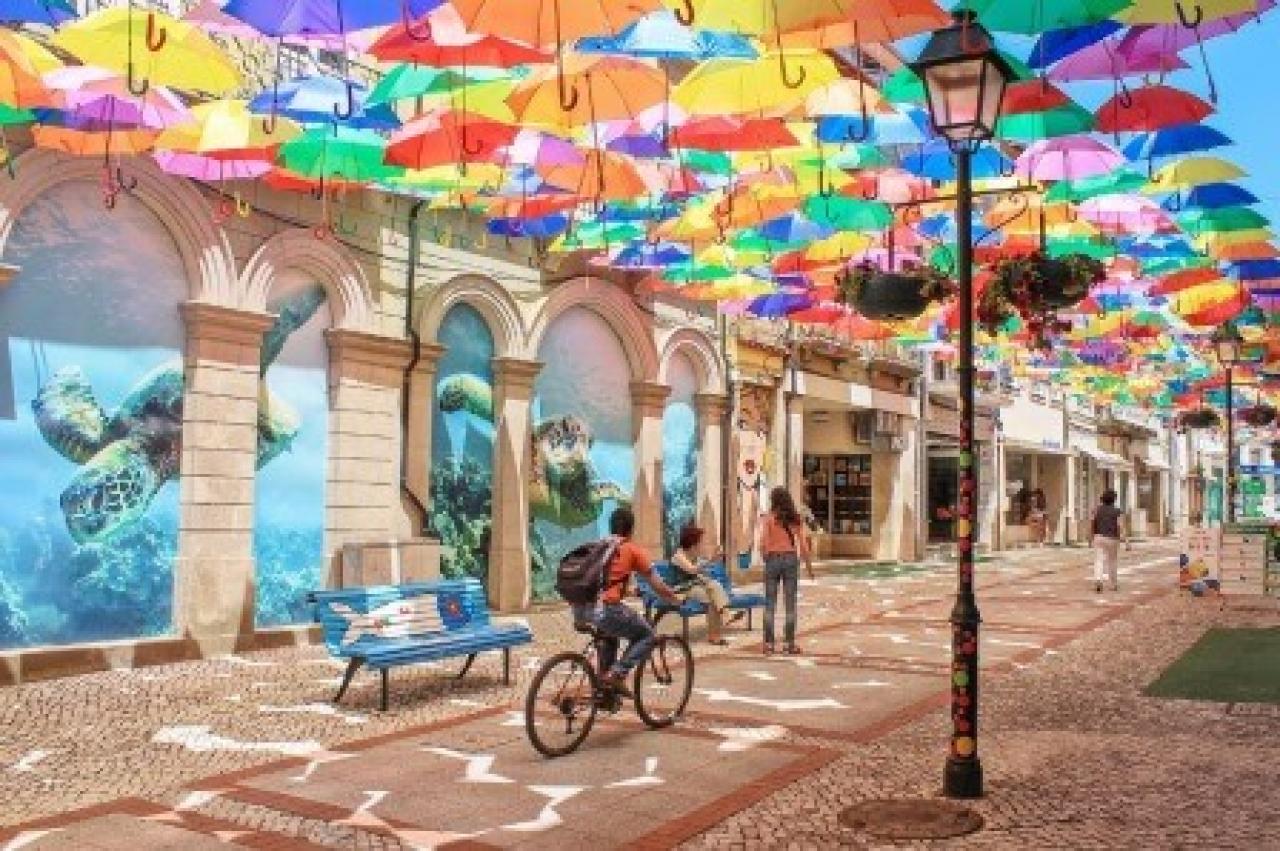
CREATIVE SPIRITS is a network of nine European cities, funded by the European Union in the frame of the URBACT III Programme. The nine CREATIVE SPIRITS partner cities have a common need to improve the implementation of their existing integrated urban strategies/action plans by including novel approaches linked to creative and cultural industries (CCI) – creative places, people and businesses. The joint policy challenge for the network is to better facilitate the above “creative ecosystem” to be able to attract (more) creative entrepreneurs and boost creative entrepreneurship in dedicated urban areas.
Climate change mitigation and adaptation are central elements of Águeda’s city strategy and our work on resilience and sustainable development. At the same time the arts and culture, cultural heritage and creativity play a key role in Águeda’s quality of life and economic prosperity. Over the last 10 years in particular, we have seen the positive economic and social benefits of nurturing our arts and culture scene. However, we are also now living the consequences of climate change – flooding and forest fires in particular.
We first heard about the Manchester Arts Sustainability Team (MAST) in 2017, when Manchester was recognised as a Good Practice City under the EU’s URBACT programme. Manchester’s winning formula - MAST’s collaboration on climate action and engagement, in a city which recognised the value of culture and was itself demonstrating climate change leadership – struck a chord. In 2018, we joined C-Change: Arts and Culture Leading Climate Action in Cities - a network of cities with URBACT funding aiming to learn from and adopt a similar approach to Manchester. Over two years, Águeda’s local C-Change group, modelled on MAST, has been at the heart of our C-Change journey. This group of committed people has, against the odds of COVID-19, managed to survive, adapt and thrive, finding new ways to keep collaborating, acting and engaging people on the climate crisis and environmental protection through the arts, culture and creativity.
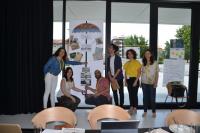
“URBACT Local Groups (ULG) are a fundamental building block of the URBACT programme. Each URBACT partner is required to set up a Local Group gathering key local stakeholders in order to co-produce city strategies and action plans.” We had a strong foundation to build on in our C-Change journey. The municipality was already taking an integrated approach to policy-making, for example, with an integrated environment and tourism department. Developing partnerships involving NGOs, public agencies, the private sector and civil society had proven to be a key component in design and implementation of effective urban initiatives. And we had extensive experience with engaging local community and stakeholders through initiatives such as Local Agenda 21, our participatory budget an d eco-schools projects. Our Climate Change Adaptation Plan 2019-2027 foresees the involvement of the community, different sectors and stakeholders, including the arts and culture, through specific actions and measures.
We had a reputation as a creative city in particular as a result of our Umbrella Sky project, which has been replicated in other cities around the world, our Urban Art Programme and, our annual AgitÁgueda Arts Festival. City support and funding for arts and culture was strong and, as a municipality, we were already promoting climate change and environmental projects through our flagship Urban Art programme and AgitÁgueda Festival. However, up to 2018, there hadn’t been any specific climate change or environmental support for the arts and culture sector.
Through C-Change our ambition, by the end of 2020, was to see culture and climate change collaboration, support, and engagement happening in our city and to align city culture and climate change policy. We knew we needed a strong local C-Change group to make this happen. Beyond getting the group up and running, we had two key concerns, how to get the group to work effectively and how to work consistently across the culture and the environmental departments. We started as we intended to continue, with both our environment and our culture departments agreeing to take on a joint role in establishing, leading and supporting the local group.
Through exchange and learning sessions with Manchester and the four other C-Change cities, we learnt more about the MAST model – participating in a MAST meeting and seeing and hearing about the type of action MAST members were taking, individually and collectively. The sessions also helped us come up with a plan for sector support. Back in Águeda we began to establish a local group bringing together organisations and individuals from the arts and culture sector we knew were already committed to climate action and engagement.
Once our local C-Change group was in place, we organised regular meetings, led by the municipality’s head of culture and/or head of environment. In the early days these meetings were more focused on planning and exchange of ideas, but they were soon to lead to concrete action and collective initiatives including: Monty Python-inspired ‘silly walks’ against pollution; environmentally-themed street mural painting with children in disadvantaged neighbourhoods; Projeto Circular, one of our two ‘Agents of Change’ pilot actions exploring the idea of connection and love for our planet through a story-telling astronaut and children’s performance , and The Sea Starts Here urban art installation.
Three local group members - Luis Silva from the Manuel Alegre Municipal Library, Viktor Fernandes a local artist involved in the GlocalMusic co-operative and Águeda Arts Centre’s Laura Almeida - did a train-the-trainer carbon literacy session in Manchester. They developed a test version of the training which was
delivered in February 2020 for a mix of city and sector representatives. In July 2020, 17 people mainly from the local group, participated in a sector-specific training session combined with a visit to Águeda’s Smart Lab neighbourhood demonstrating solutions which could be easily scaled up such as a solar bench for charging phones. Then in October 2020, Luis and Viktor did a version of the training for the public during the Águeda Smart City Lab open day. Both July and October sessions featured a take-make-repair activity and a visit to Viktor’s materials workshop to see how he was putting sustainability at the heart of his artistic practice.
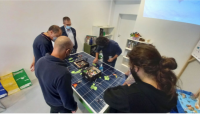
When the Covid-19 pandemic hit, the group moved to virtual meetings and began to work more independently of the municipality, using tele-esplanada an on-line collaboration tool and creating its own WhatsApp group and Facebook page to keep communication going. During online meetings the group mapped out what the arts and culture sector was doing across the city on environment and climate change, discussed topics of common interest as well as municipal projects on low and zero carbon solutions and how they might put these solutions in place.
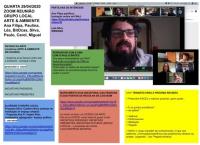
As we progressed on our C-Change journey, the municipality was increasingly investing in nature and climate-change themed urban art projects. At the same time new members joined the C-Change group, including not only cultural organisations and local artists, but also environmental protection associations, local environmental activists and even outdoor sports enthusiasts. This resulted in some new collaborations such as: Agueda Arts Centre’s project with a local high-school on material reuse in artistic practice; CircoAgitado no Vale using circus arts to raise environmental awareness at the Vale Domingos Botanical Park, and; AgitAgua artists crossing the river Águeda in bamboo structures they had built, performing as the voice of water and the life which it supports, telling us why and how we need to conserve and protect it.
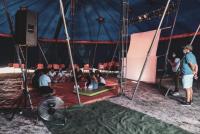
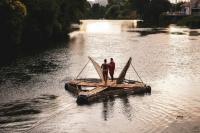
Today Agueda’s C-Change group has 27 members, including the Águeda Arts Centre, the Manuel Alegre Municipal Library, the Vouga Railway Museum, the cultural cooperative Glocalmusic and Living Place an eco-tourism organisation. It has become a self-sufficient group and a model of collaboration which are extending to other sectors such as sports and tourism. This group, our agents of change, is committed to future action on climate and engaging with the people of our city on the climate crisis and environmental protection.
